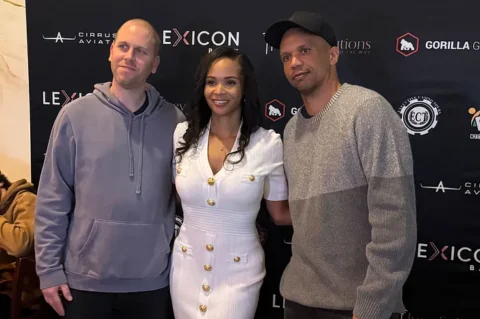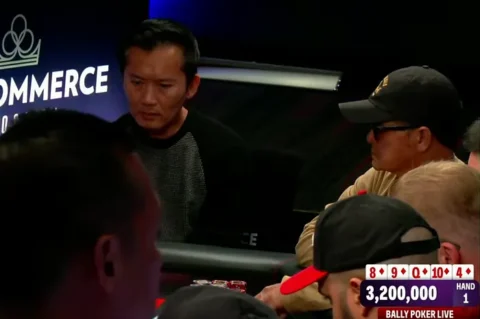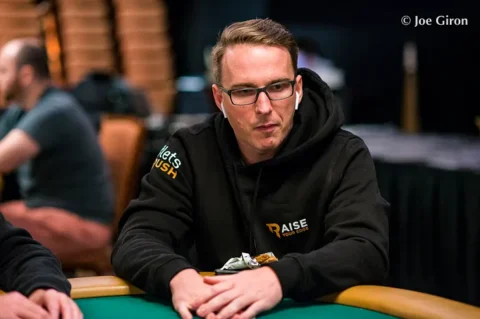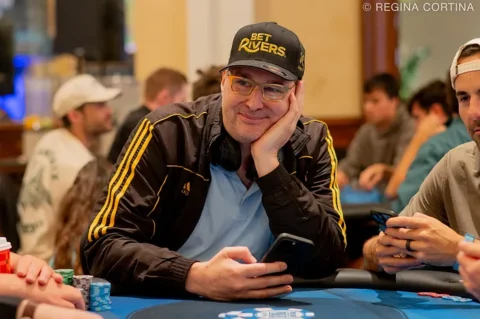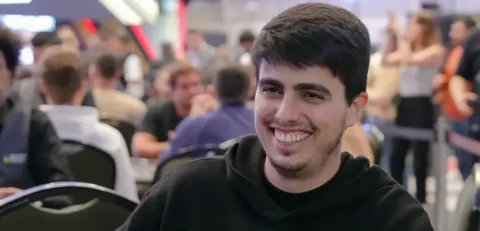As the Associate Director of Creative & Content at PokerStars, Francine Watson has played a key role in shaping the visual identity and storytelling approach of one of the most recognizable brands in the industry. From producing high-profile content to ensuring PokerStars remains at the forefront of poker entertainment, her influence is undeniable.
Francine’s exceptional work was recently recognized at the 2024 Global Poker Awards, where she was honored as Industry Person of the Year. Though she primarily works behind the scenes, Francine’s work has helped bring some of the most memorable poker moments to life while solidifying PokerStars’ reputation as a leader in content and branding.
In this exclusive interview, we take a deep dive into Francine’s journey — from her early career to her biggest projects at PokerStars, her thoughts on winning a prestigious industry award, and what the future holds for her in poker.

Can you share a little about your background before entering the poker industry? Where did you grow up, and what were your early career aspirations?
I grew up in Berkshire and the surrounding area, and it’s fair to say neither of my parents found a true vocation when it came to work. So, I learnt from a young age how important it is to enjoy what you do. I consider myself very lucky that as soon as I got to secondary school, I knew I wanted to work in television – especially live. It always seemed to me some kind of ‘magic’ that the pictures got onto our collective screens. Back then, there wasn’t any ‘behind-the-scenes’ footage, so the whole industry had this air of mystery. My parents would have preferred me to go into something a bit more traditional and ‘secure’, but were supportive and after some badgering, they managed to get me work experience with a friend who edited Eastenders (a big UK soap opera). I was 14 at the time and after a couple of weeks at Elstree I was absolutely hooked – TV was my future. I set about getting as much experience as I could, initially at Sky Sports and then, while at Birmingham University I applied for a summer training scheme with an independent sports production company, Sunset+Vine. Again, I loved it, and S+V became my home as soon as I left university, starting out on the award-winning Channel 4 Cricket.
How did you first get introduced to poker? Was it something you had an interest in before working in the industry?
I had no knowledge of poker before starting production on the EPT! I’d been working on all kinds of live sports for a few years when John Duthie (who as well as playing poker was directing TV drama at the time) approached S+V to help bring a poker tour to Europe and put it on TV, offering players and viewers this side of the pond something that could rival the WPT and WSOP. When our Head of Production asked me if I’d like to be involved, I remember thinking ‘this’ll be a one-year wonder’ but travelling with a European tour will be fun, plus, my only real experience of casinos at that point was from watching James Bond films, so the glamour of ballgowns and tuxedos had me at hello. (I would quickly be disappointed on that front.)
The first stop of the EPT at Barcelona was a baptism of fire for us. Yes, we were a team of highly experienced live sports professionals, but the only person in the gallery who understood the game was John Duthie. I was logging hands at the time, and pretty much only got excited if someone was dealt aces. It was chaotic, but we covered the action and started producing hour-long programmes for TV. That was 20 years ago, and we’ve recently delivered the EPT 20 shows from Barcelona for global distribution. I’m proud to see the EPT and its content going as strong as ever all these years later.
Obviously, poker isn’t necessarily the most conventional of industries to get into. How did your family and friends initially react when you told them that you’d be utilizing your talents in such a relatively non-traditional industry?
I think they were probably bemused – what is this poker and how can filming it possibly have any longevity?! As the years passed, and the tour grew, its legitimacy couldn’t be denied. But more than that, it was clear that poker was giving me more opportunity than I would have found in more traditional sports. Back then it was a male-dominated industry, and I would likely have been pigeonholed into a logistics role. Poker allowed me to switch over into my dream role – producing.
When and how did the opportunity to join PokerStars come about? What attracted you to the company?
I had been working indirectly with the team at PokerStars for seven years when they decided they wanted to build a production team in-house. We were making 50 TV shows a year back then and the popularity of live streaming was growing fast, so it made sense to invest in a production resource internally. I’d been freelancing for a couple of years, expanding my poker experience into the US producing at the World Series for 441 Productions and then the NAPT. I had loved the freedom, but the challenge of building a team in-house and starting to think about wider content plans for Social and YouTube was exciting. I knew that PokerStars was a passionate, player-first company that wanted to offer the best possible experience to players and viewers, so it felt like a great fit.
How many men does it take to put on our set legs? MANY. #PCA2018 #PokerStarsTV pic.twitter.com/NnQIOqNm3H
— Francine Watson (@franciiiiine) January 4, 2018
You’re currently the Associate Director of Creative & Content at PokerStars. Can you give us an overview of your role and what your day-to-day work entails?
My role has evolved enormously, especially over the last 18 months. I now manage a 30-strong team of designers, creatives, producers, tech specialists and production managers who work across everything from live event, campaign and merchandise design through to TV, live stream, and Social and Digital content production. No two days are the same, I might kick off by viewing the latest Big Game on Tour cut, move onto a creative and messaging meeting for a new promotion, and then go into a live stream production meeting for EPT Monte Carlo. We’re lucky to be helping to shape key PokerStars offerings, like the newly launched PokerStars Open – from ideation through to designing the visual identity for the tour and then the event branding itself. It’s rewarding to see every aspect brought to life by this talented team.
I imagine things get busier around the TV production and filming during live events. Can you describe what those busier times are like versus the relative lulls in between live events?
Lulls?! There are no lulls anymore!
PokerStars has obviously gone through a number of changes over the years as a company, yet you’re remained a constant fixture there for two decades. In what ways have you seen your role evolve over the years? What keeps you rooted there as the industry continues to evolve?
Standing still gives me itchy feet, so fortunately, at PokerStars that’s never been a problem. Yes, there have been lots of changes over the years, but it’s always been an ideas-driven business that encourages out of the box thinking, allowing teams to grow and evolve.
Look at something like the PSPC – imagine pitching that idea! Such an ambitious project, but Stars saw the opportunity for players and got behind it unequivocally. Fundamentally, they understand the value of poker storytelling, and that’s a huge reason I’ve stayed for so long. I was talking to a couple of very well-known pros at the GPI awards last year and they asked ‘how is it that we’re watching some of your Shark Cage shows from over 10 years ago and they look and feel more contemporary than content and streams being produced today?’ The answer is that we have the most experienced and passionate production personnel in the world, and the backing of a brand who believes in the impact and long-term power of shows like this to keep the game in the mainstream.
How much of the content being produced today will be being watched 10+ years from now? For as long as we continue to tell stories and make content that viewers remember, I’ll be sticking around.
One of my favourite photos from #EPTBarcelona (by @BigSlickNeil). On the #EPTLive set with @Stapes & @franciiiiine… pic.twitter.com/y2VDFbHWKa
— James Hartigan (@J_Hartigan) September 2, 2015
You’ve worked on some highly visible PokerStars productions, from live event coverage to original content. What are some of the projects you’re most proud of having spearheaded and worked on over your time at the company?
Our EPT TV shows will always hold a special place in my heart, having worked across them since the tour’s inception but developing and producing Shark Cage was enormous fun. Who would have thought that some of the biggest poker pros and celebrities would risk being put in a cage on TV all in the name of ‘pokertainment’?! I’ve been lucky enough to work on high-profile content series like ‘Duel’, starring Ronaldo and Neymar Jr that amassed millions of views but I’m most proud of the Daniel Negreanu documentary ‘KidPoker’ which Gary Davis, now Head of Creative for PokerStars and I directed together.
Agghhhhhhhh! pic.twitter.com/8LjvR51u7z
— Francine Watson (@franciiiiine) November 26, 2015
People often ask what has kept me in poker for so long, and telling the stories of fascinating characters like Daniel is the reason. Someone giving you such intimate access to all aspects of their life is a gift but doing that gift justice in edit was the hardest thing I’ve ever done career-wise. It was also incredibly rewarding. Netflix buying the film was the icing on the cake.

James Hartigan, Daniel Negreanu and Francine Watson
Of course, more recently, PokerStars brought back The Big Game, which was another great privilege for me and the team. This iconic show brought so many players into the game and is beloved by all so there was certainly a pressure there not to mess it up! It was brilliant fun to shoot and produce and we’re just happy that the fans seem to be enjoying watching it as much as we love making it. With the line ups and huge action on show, it’s a format that can break beyond the traditional boundaries of poker audiences, and getting the game in front of as many people as possible is what gets the team and I out of bed in the morning.

What’s been the most challenging (and/or rewarding) project you’ve taken on in your career, and how did you navigate those challenges?
Any time you develop a show from start to finish it’s a challenge, so Shark Cage, Duel, KidPoker, the Mystery Cash Challenge, all ‘PokerStars Originals’ if you will, all saw their fair share of challenges along the way. Poker as a game doesn’t make new formats easy, purely because like any sport, there’s just no guarantee that the players you want or need to run deep do. It’s also a complicated game, so when you’re trying to ‘fun up’ a format by adding in challenges or forfeits you quickly get to a place where what you’ve created is too hard to follow. The joy in development though is testing, testing, testing! We’re a poker passionate bunch, so we take great pleasure in stress-testing the formats (usually over a beer and a pizza!).
Congratulations on winning the 2024 Global Poker Award for Best Industry Person! How did it feel to receive that recognition from your peers?
I was shocked – I didn’t expect to win this category, ever! The imposter syndrome definitely kicks in when you’re up against industry heavyweights like Matt Savage, Andy Wong and Gregory Chochon. I’m so proud.
🌐♣️🏆 Your Industry Person of the Year is PokerStars Executive Producer Francine @franciiiiine Watson #GlobalPokerAwards pic.twitter.com/dhm6QEsdPj
— Global Poker Index (@gpi) February 23, 2025
To be recognized by my peers in my 20th year in poker felt kind of poetic. My approach to our shows, live streams and to all our content is unique in that I came into poker knowing very little and fell in love with the game and its characters and they sit at the heart of all we do. Some productions focus on the hardcore aspects of the game, some take a more mainstream approach but lose authenticity. I like to think our shows blend poker detail and storytelling in the most compelling way, ensuring they appeal to the widest audience. That’s the hope anyway! To be recognized for all the hard work, but fundamentally for something I love doing every day is incredible. I’m so grateful to Eric Danis, the GPI and everyone who voted.
I have to admit that even I, with my finger firmly on the pulse of the industry, didn’t really “know who you were” until Joe Stapleton began openly campaigning for you to be recognized as a GPI nominee a couple years back. I think it’s wonderful that he succeeded at that and that your contributions have become more publicly recognized outside the walls of company HQ. How do you relate to “suddenly” becoming more of a public figure in poker and emerging from the shadows after nearly two decades of diligently “putting in the work” behind the scenes?
Joey is the ultimate cheerleader and campaign manager! I’m so grateful to he and James for all they do to lift me up. It’s very strange to suddenly be recognized though, yes. I’ve spent my life in edits ‘getting to know players’ and then walking up to them at EPTs saying ‘hi’ and being shocked when they look at me blankly! The truth is, I like being behind the scenes and the interviews and speeches do not come naturally to me. I love what I do and that’s my focus.
Global Poker Awards nominations came up on me pretty quick this year, but without looking at any of the names on the list, I want to remind everyone that FRANCINE WATSON is the human behind all the EPTs, live streams, Shark Cage, The Big Game, and more over the past decade plus.
— Joe “Legacy Blue” Stapleton (@Stapes) January 11, 2025
That being said, at the awards ceremony I met the brilliant Abby Merk and her Mum, and that was probably the first time that I felt my higher profile was important – for young women coming into the game. Her Mum asked me what it’s like on the ground at poker tournaments, and I remember when my parents nervously quizzed me around the same topic. If I can help to reassure and encourage the new generation of players and content creators then that’s wonderful, and again, not something I ever expected.
Most people who get into the industry side of the poker world do so out of love for the game and their chosen profession. Getting public recognition in the form of a nomination or award is a bonus. Most folks just show up to work each day and do their job; that’s fine and totally normal. Only recently have you sort of become a notable exception in that regard. What advice or words of wisdom do you have for the legions of people who work behind the scenes in the poker world, getting little to no public recognition for what they do outside of their internal teams?
Keep on keeping on, take pride in your work, be confident in your value and surround yourself with good people who support and cheer each other on. Ultimately, I think recognition comes when you are doing the thing that you love and giving it your all. It’s hard for the universe to ignore that.
What does being recognized as 2024 Industry Person of the Year mean to you personally and professionally?
It means the world. I didn’t think I’d win, but I really wanted to. It’s validation for all the years of hard work and not just for me but the whole team. I couldn’t have done it without them, many of whom have been with me since the very beginning. It takes a village, and my village is the best of the best. It also takes a huge amount of patience and support from family and friends – missing what’s going on back home never gets any easier but knowing they’re there for you unconditionally makes it all possible.
These faces are WINNERS!! Trophy’s on her way home, team 🏆 pic.twitter.com/FH0GqyrMUh
— Francine Watson (@franciiiiine) February 25, 2024
What are some of your long-term goals within PokerStars? Are there any exciting projects on the horizon that you can share?
Well, the pressure’s on now! The new season of the Big Game is about to launch on YouTube and Fox in the US and I don’t think I’m going out on a limb by saying one of the line-ups will to be the most exciting we’ve ever seen.
Longer-term, we’re focused on innovation around live streaming and new format development. PokerStars has a long history of believing and investing in the power of great poker content, so the plan is to keep raising the bar. Watch this space.

